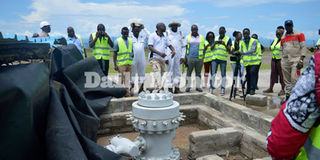Covid deals double blow to oil service providers

Reduced activity in the oil sector, worsened by Covid-19-related lockdown, has seen a number of service providers struggle to survive. Photo | File
What you need to know:
- At the close of last year oil activities had substantially reduced due to disputes over Tullow sale out. However, Covid made an already bad situation worse.
- According to Emmanuel Mugarura, the chairperson of the Association of Uganda Oil and Gas Service Providers Association, “the oil and gas sector doesn’t exist in isolation and because the economic upheaval have affected all the sectors of the economy, the oil sector has not been an exception.
A glimmer of hope is starting to trickle in the oil sector.
The fast-tracking of the Tullow farm down and resumption of negotiations in regard to the proposed East African Crude Oil Pipeline is now in sight.
This seems to be the rallying point to final investment decision, when the joint venture partners, Total E&P and CNOOC, will announce investment plans for their projects including financing.
However, over the course of the last two years the waiting for final investment decision compounded by protracted negotiations has left, especially local oil service providers on the.
The situation has been not been helped by Covid-19 that locked the country for almost four months.
Service providers ranging from small to large scale enterprises have all been affected at varying levels.
According to Emmanuel Mugarura, the chairperson of the Association of Uganda Oil and Gas Service Providers Association, “the oil and gas sector doesn’t exist in isolation and because the economic upheaval have affected all the sectors of the economy, the oil sector has not been an exception.
“First was the disagreements, then prices of crude oil started going down; so you start wondering whether this (Uganda oil) project is going to happen at all,” he says.
Good days
During the good days when the joint venture partners were moving between discovery and appraisal, Hoima Farmers Federation brought together some 987 members, mainly farmers.
Moses Byenkya, the coordinator of the association says it was a moment to relish because “business was really good although it was a mix of flesh and bones but still brought some prosperity”.
“A cabbage that ordinarily cost Shs700 moved to Shs7,000 and a bunch of matooke that sold for Shs1,000 went upwards to Shs10,000,” he says.
However, Byenkya says, between 2012 and 2017, oil activities started to decline but regardless there was a lot of “knowledge transfer and experience” from trainings in among others standards, food safety, and quality management.
“It is because of oil that we saw new crops such as cucumber, fresh beans, broccoli and others. Initially most of our farmers had been growing about seven crops but increased to 63 - indigenous and foreign crops,” he says.
The reduction in activities scattered many members as they diversified into other market chains such as hotel and hospitality. Then gradually oil activities literally grounded to a halt as government and joint venture partners worked out the Tullow deal, before Covid-19 completely spoil the party.
“Transporting produce became a nightmare. Farmers could hardly move yet many of them had loans to payback. However, we are optimistic. From the various interactions, we have been made to believe that FID will take place soon, and when that happens Hoima and farming will be on another level,” Byenkya says.
Covid-19, Mr Mugarura says, has had serious impact on local oil service providers, taking away the little business that had remained.
“This state of affairs started with the collapse of the (farm down) deal. It was like the end of the road. The momentum that people had started building all came down, but now that partners are back to the drawing board, we can start the long walk to first oil,” he says.
Uganda’s oil sector is entering the next phases of development and commercial production.
If all goes according to plan, the country is expected to rake in investments of about $10b (Shs36 trillion) from among others, development of two oil projects - Tilenga operated by Total E&P in Nwoya and Buliisa districts, and Kingfisher operated by CNOOC in Kikuube District.
Other proposed mega infrastructures include the oil pipeline from Hoima to Tanga port in Tanzania and the refinery in Hoima district.
Ms Betty Namubiru, the Petroleum Authority of Uganda manager for the local content, admits the last months have been challenging for oil service providers but she is optimistic.
“$20b is going to be invested when FID is taken and what does that mean for the country? This is an opportunity for us to further prepare, tighten every loose end,” she says and notes that the delay presents an opportunity for service providers to prepare.
Facing challenges
Local oil service providers still have challenges of failure to adhere to standards, lack of business plans and financial records and poor banking and borrowing history, which skews competition out of their favour.
Between 2006 and 2016 Uganda investments of up to $3.2b (Shs11 trillion), of which local service providers shared about 28 per cent or roughly $900 million (Shs3b).
Much of the share for local content providers was in logistics, clearing and forwarding, supply chain management, catering services, air transport services (light aircraft carriers to the field) and camp management services.
“The delays have had implications but you realise that majority of our suppliers have not been well prepared. This is a great opportunity for us to prepare,” Ms Namubiru says.



